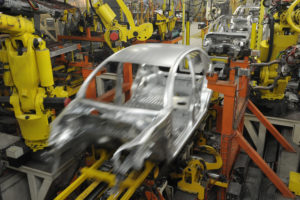The UK’s automotive industry is ready to deliver a new supply chain competitiveness and productivity solution following Government’s Industrial Strategy white paper.
 Automotive industry has co-developed a new programme that will boost the competitiveness and productivity of the UKs advanced manufacturing supply chain.
Automotive industry has co-developed a new programme that will boost the competitiveness and productivity of the UKs advanced manufacturing supply chain.
In response to the launch of the Industrial Strategy white paper by the business secretary, Greg Clark, yesterday, SMMT Industry Forum – the organisation set up by the UK government, the Society of Motor Manufacturers and Traders (SMMT) and vehicle manufacturers to improve the competitiveness of the UK’s automotive supply chain – welcomes the announcement of a new Supply Chain Competitiveness programme as part of the Automotive Sector Deal.
Over the last 18 months, the aerospace and automotive industries have been working closely together to develop a cross-sector approach to boosting the competitiveness and productivity of the advanced manufacturing sector supply chains in the UK. The result is a new programme, National Manufacturing Competitiveness Levels (NMCL), created by the Government-sponsored Automotive Council and Aerospace Growth Partnership bodies as well as the SMMT and Aerospace, Defence, Securities and Space (ADS) trade associations. It is backed by 25 of the UK’s largest manufacturers and early stage discussions and pilots are already underway with the rail and nuclear sectors.
NMCL builds on the experience gained in previous national programmes. Notably, it takes a more holistic view of manufacturer performance improvement, with a focus on competitiveness in addition to productivity: achieving customer impact and winning new business.
“We welcome yesterday’s Industrial Strategy white paper which commits to launching a new cross-sector supply chain competitiveness programme to encourage industry leaders and the best performing sectors to improve further by adopting best practice as exemplified by the automotive sector. Our Automotive Sector Deal also commits to rolling out an industry-led supplier improvement programme to boost the competitiveness of supply chain companies needed to manufacture current and future generations of vehicles at volume, and increase UK content from 44% to 50% by 2022.
We stand ready to work with Government to deliver much needed competitiveness and productivity improvements. NMCL captures the best of manufacturing know-how and provides the practical means for driving industry best practice across hundreds of advanced manufacturing supply chain companies to genuinely move the needle on the UK’s productivity dial,” says SMMT Industry Forum CEO, Dr. Chris Owen.
SMMT Industry Forum has more than 20 years’ experience helping advanced manufacturing companies become more competitive. Over the last four years, the Automotive Council has run its Long-Term Automotive Supply Chain Competitiveness (LTASC) programme through SMMT Industry Forum where it has worked with over 70 automotive supply chain companies, large and small, to upskill hundreds of employees, boost productivity, deliver new products to market, leverage more than £75m of private investment in CAPEX, skills and R&D, and is set to create and safeguard more than 3,800 jobs. SMMT Industry Forum has also been the largest provider of knowledge and expertise to deliver the aerospace industry’s Sharing in Growth (SiG) programme.
How does NMCL work?
 The NMCL programme provides manufacturers with an in-depth assessment of their competitiveness, based on their company capabilities and the views of their key customers. This data is used to aid investment decisions, according to the needs of each manufacturer, across six competitiveness areas of quality, cost, delivery, flexibility, products and/or technology and customer experience.
The NMCL programme provides manufacturers with an in-depth assessment of their competitiveness, based on their company capabilities and the views of their key customers. This data is used to aid investment decisions, according to the needs of each manufacturer, across six competitiveness areas of quality, cost, delivery, flexibility, products and/or technology and customer experience.
Programmes are tailor-made for each manufacturer and are focussed exclusively on boosting the competitiveness of the company, increasing their ‘value add’ and winning more orders.
Company projects will typically last from six months for smaller improvement projects, and up to three years for entire business transformations and will use practical resources and share best practices which have been developed by aerospace and automotive industries working together in partnership.






